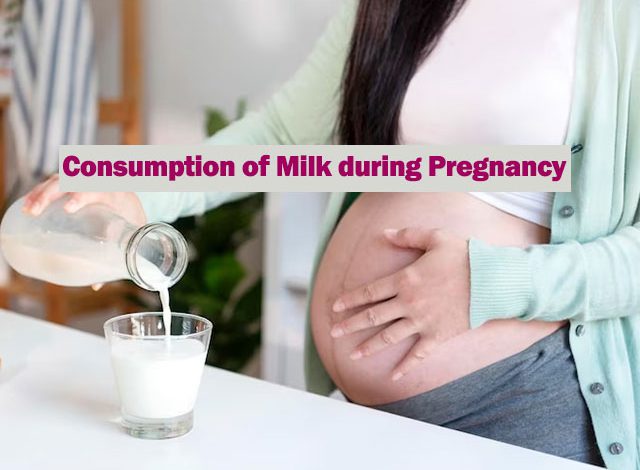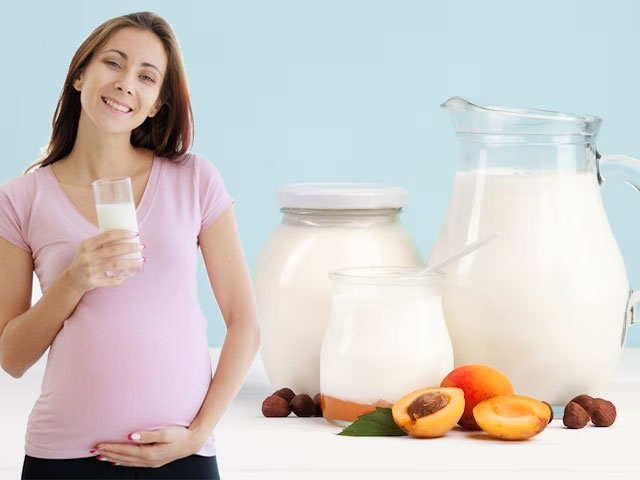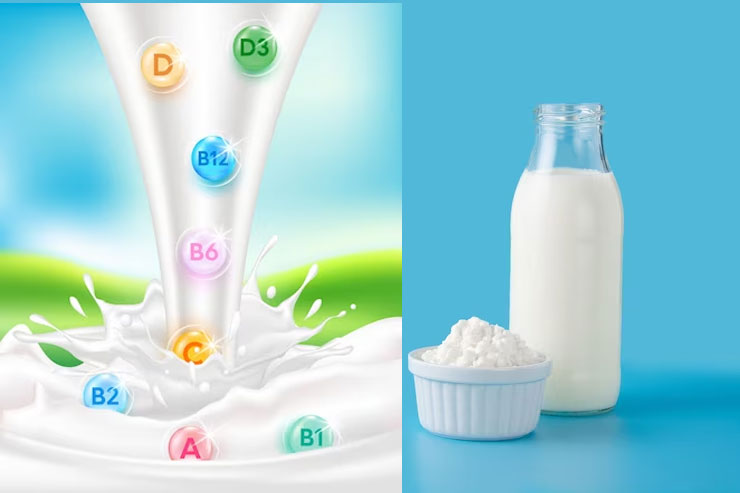Consumption of Milk: Benefits and Risks during Pregnancy

Pregnancy is a critical phase in a woman’s life, and proper nutrition during this period is of utmost importance. One dietary item that receives considerable attention during pregnancy is milk. In this article, we will explore the consumption of milk, its benefits, and potential risks during pregnancy.
Benefits of Milk during Pregnancy:
Essential Nutrients:
Milk is a rich source of essential nutrients such as calcium, protein, vitamins (including vitamin D and B-complex vitamins), and minerals (such as phosphorus and magnesium). These nutrients are crucial for the healthy development of the fetus, the mother’s bone health, and overall well-being.
Calcium for Bone Development:
Calcium plays a vital role in the formation of the baby’s bones and teeth. Pregnant women need increased calcium intake to support the growing needs of the fetus and to prevent the depletion of calcium from their own bones.
Protein for Growth:
Protein is necessary for the growth and development of the baby’s tissues and organs. Milk provides high-quality protein that helps meet the increased protein requirements during pregnancy.
Vitamin D Absorption:
Milk fortified with vitamin D aids in the absorption of calcium, promoting strong bones and teeth for both the mother and the baby.
Hydration:
Proper hydration is essential during pregnancy. Milk can contribute to overall fluid intake and help prevent dehydration.
Risks and Considerations Milk:
Allergies and Lactose Intolerance:
Some individuals may have allergies or lactose intolerance, which can make the consumption of milk problematic. If a pregnant woman has known allergies or lactose intolerance, alternative sources of calcium and other nutrients should be considered.
Contamination and Safety:
It is important to ensure the safety of the milk consumed during pregnancy. Raw or unpasteurized milk can contain harmful bacteria such as Listeria, which poses a risk of foodborne illnesses. It is recommended to choose pasteurized milk to minimize such risks.

Weight Gain:
While milk is a nutritious beverage, excessive consumption can contribute to excessive weight gain during pregnancy. It is important to maintain a balanced diet and monitor overall calorie intake.
Dietary Diversity:
Relying solely on milk for nutrients may result in an imbalanced diet. It is advisable to consume a variety of other healthy foods to ensure a well-rounded and diverse nutritional intake.
What are the side effects of drinking milk while pregnant?
While milk consumption during pregnancy is generally considered safe and beneficial, some women may experience certain side effects or discomforts. It’s important to note that these side effects are not universal and may vary from person to person.
Here are some potential side effects of drinking milk while pregnant:
- Digestive Issues: Some pregnant women may experience digestive discomforts such as bloating, gas, or diarrhea due to lactose intolerance or difficulties in digesting dairy products. This occurs when the body has insufficient lactase, the enzyme needed to break down lactose (the sugar present in milk).
- Allergic Reactions: In rare cases, individuals may have an allergic reaction to proteins present in milk, such as casein or whey. Symptoms can range from mild, such as hives or itching, to severe, such as difficulty breathing or anaphylaxis. It’s important to seek immediate medical attention if experiencing severe allergic reactions.
- Weight Gain: While milk can be a healthy part of a balanced diet, excessive consumption of milk or dairy products can contribute to excessive weight gain during pregnancy. It is essential to monitor overall calorie intake and ensure a well-rounded diet.
- Acid Reflux or Heartburn: Some pregnant women may experience an increase in acid reflux or heartburn symptoms after consuming milk. This could be due to the relaxing effect of pregnancy hormones on the lower esophageal sphincter, which can allow stomach acid to flow back up into the esophagus.
- Increased Mucus Production: Drinking milk may cause an increase in mucus production in some individuals, leading to nasal congestion or respiratory discomfort. However, the scientific evidence supporting this association is limited and inconclusive.
- Contamination Risks: If milk is not handled or stored properly, there is a risk of bacterial contamination, such as Listeria monocytogenes, which can cause foodborne illnesses. It is crucial to choose pasteurized milk and follow proper food safety practices to minimize these risks.
It is important to consult with your healthcare provider if you experience any persistent or severe side effects after consuming milk during pregnancy. They can provide personalized advice based on your specific circumstances and recommend suitable alternatives if necessary.
How much milk is safe during pregnancy?
The amount of milk considered safe during pregnancy can vary depending on individual needs and dietary factors. However, general guidelines recommend consuming moderate amounts of milk as part of a well-balanced diet. Here are some recommendations to consider:
- Consult with Healthcare Provider: It is important to consult with your healthcare provider, such as an obstetrician or a registered dietitian, who can provide personalized advice based on your specific needs, dietary preferences, and any underlying health conditions.
- Follow Dietary Guidelines: In many countries, dietary guidelines suggest consuming 2 to 3 servings of dairy or dairy alternatives per day during pregnancy. A serving size can be approximately 1 cup (240 ml) of milk or yogurt.
- Nutritional Balance: While milk is a good source of essential nutrients, it’s important to maintain a balanced diet that includes a variety of other food groups as well. Incorporate other sources of calcium, protein, and vitamins into your meals, such as leafy green vegetables, legumes, fortified plant-based milk alternatives, and lean meats or plant-based protein sources.
- Consider Calcium Intake: Adequate calcium intake is crucial during pregnancy for the development of the baby’s bones and teeth. In addition to milk, calcium can be obtained from other dairy products, fortified non-dairy milk alternatives, calcium-rich vegetables, and supplements if recommended by your healthcare provider.
- Individual Tolerance: Pay attention to your body’s response to milk consumption. If you experience digestive discomfort, such as bloating or gas, it may be an indication of lactose intolerance. In such cases, lactose-free milk or other calcium-rich alternatives can be considered.

Remember, the recommended amount of milk may vary based on individual needs and preferences. It is essential to focus on overall dietary diversity, listen to your body, and consult with healthcare professionals to ensure a balanced and healthy pregnancy diet.
What happens if you don’t drink milk during pregnancy?
If you choose not to consume milk during pregnancy, it is important to ensure that you obtain adequate nutrients from other dietary sources to support your own health and the development of the baby. While milk is a good source of several essential nutrients, there are alternative ways to meet your nutritional needs.
Here’s what can happen if you don’t drink milk during pregnancy:
- Calcium Deficiency:
Milk is commonly associated with calcium, which is crucial for the development of the baby’s bones and teeth, as well as for maintaining the mother’s bone health. If you don’t consume milk, it’s important to seek alternative sources of calcium such as leafy green vegetables (e.g., broccoli, kale), fortified plant-based milk alternatives, tofu, almonds, or calcium supplements recommended by your healthcare provider.
- Protein Insufficiency:
Milk is a significant source of high-quality protein, which is essential for the growth and development of the baby’s tissues and organs. If you choose not to drink milk, ensure that you include other protein-rich foods in your diet, such as lean meats, poultry, fish, eggs, legumes (beans, lentils), nuts, and seeds.
- Vitamin D Deficiency:
Some milk products are fortified with vitamin D, which aids in calcium absorption and supports bone health. If you avoid milk, consider alternative sources of vitamin D, such as fortified plant-based milk, fatty fish (salmon, mackerel), eggs, or exposure to sunlight (with appropriate protection and considering geographical location and season).
- Other Nutrient Considerations:
While milk provides various vitamins and minerals, such as vitamin B12, vitamin B2 (riboflavin), phosphorus, and potassium, these nutrients can also be obtained from other food sources. Ensure that your diet includes a wide range of fruits, vegetables, whole grains, lean proteins, and healthy fats to meet your nutritional requirements.
It is important to note that there are individuals who are lactose intolerant or have allergies to milk proteins. In such cases, it may be necessary to explore alternative sources of nutrients or consult with a healthcare provider or registered dietitian to develop an appropriate dietary plan.
Ultimately, the key is to maintain a well-balanced and varied diet, ensuring that you obtain essential nutrients from a diverse range of foods to support a healthy pregnancy. Consulting with a healthcare professional or registered dietitian can provide personalized guidance based on your specific dietary needs and preferences.
What month should a pregnant drink milk?
Pregnant women can consume milk throughout their entire pregnancy, starting from the early stages and continuing until delivery. Milk can be a part of a healthy and balanced diet during pregnancy, providing essential nutrients like calcium, protein, vitamins, and minerals.
It is important to note that the nutritional needs of pregnant women remain consistent throughout pregnancy. The increased nutrient requirements are present from the beginning to support the growth and development of the baby. Therefore, there is no specific month or trimester when pregnant women should start or stop drinking milk.
From the moment a woman confirms her pregnancy, it is advisable to focus on a well-rounded diet that includes various food groups, including milk or dairy alternatives, to ensure an adequate intake of essential nutrients.
Remember that individual preferences, dietary restrictions, and any specific guidance from healthcare providers should also be considered. Consulting with a healthcare professional or a registered dietitian can provide personalized advice based on your specific needs and circumstances. They can help you establish a suitable dietary plan that includes milk or suitable alternatives to meet your nutritional requirements throughout your pregnancy.
Is it okay to drink regular milk while pregnant?
Yes, it is generally safe to drink regular pasteurized milk during pregnancy. Pasteurization is a process that involves heating milk to kill harmful bacteria, making it safe for consumption. Regular milk, when pasteurized, provides a good source of essential nutrients such as calcium, protein, vitamins (including vitamin D and B-complex vitamins), and minerals.

Drinking regular milk can be beneficial during pregnancy as it helps meet the increased nutritional needs of both the mother and the developing baby. Calcium is particularly important for the development of the baby’s bones and teeth, while protein supports tissue growth. The vitamins and minerals present in milk contribute to overall maternal health and well-being.
However, it’s important to note that some individuals may have specific dietary restrictions or intolerances. If you have a known allergy or intolerance to milk, or if you experience digestive discomfort after consuming milk, it may be necessary to explore alternative sources of calcium and nutrients or opt for lactose-free milk or dairy alternatives.
If you have any concerns or specific dietary considerations, it is recommended to consult with your healthcare provider or a registered dietitian, who can provide personalized advice based on your individual needs and circumstances.
Conclusion:
Milk can be a valuable component of a healthy diet during pregnancy, providing essential nutrients like calcium, protein, and vitamins. However, individual factors such as allergies, lactose intolerance, and safety considerations should be taken into account. Pregnant women should consult with their healthcare provider to determine the appropriate amount and type of milk consumption based on their specific needs and circumstances. A balanced and varied diet, along with regular prenatal care, is key to ensuring a healthy pregnancy.
